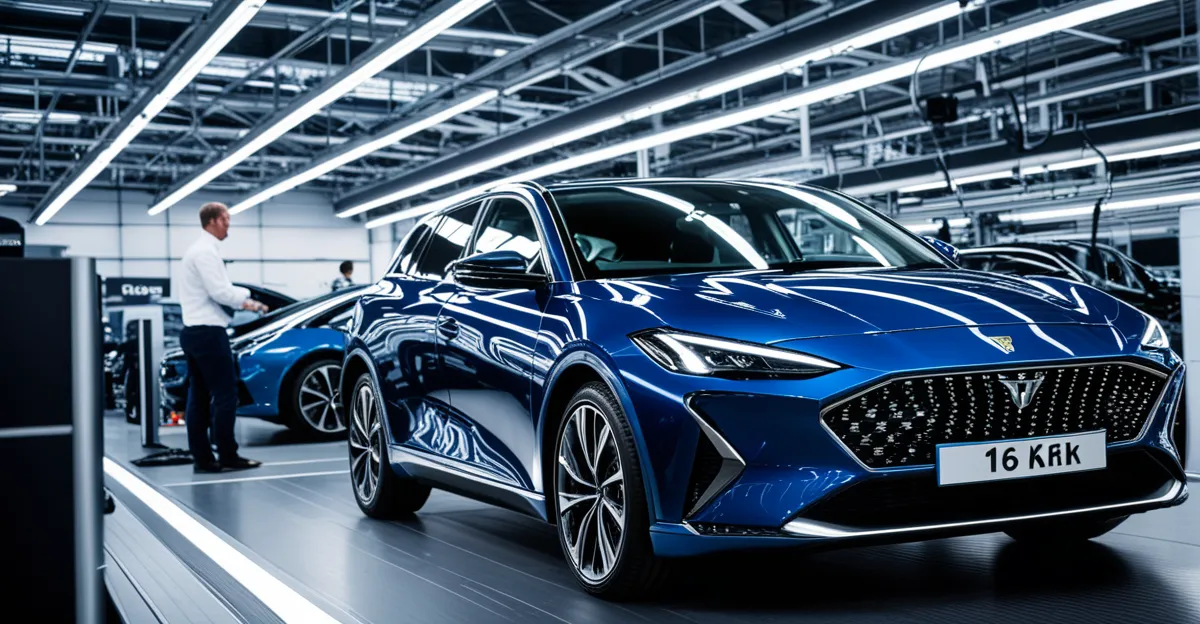Cutting-Edge Electric Vehicle Developments in the UK
Electric vehicles (EVs) in the UK represent a rapidly evolving sector marked by significant growth and innovation. UK automotive innovation is driving increased adoption rates, with domestic manufacturers expanding their EV offerings to meet rising consumer and regulatory demands. This surge reflects both a market shift and a strategic commitment to sustainable mobility.
Central to these developments are breakthroughs in battery technology, an essential component of EV technology advances. UK-based companies have made strides in creating batteries with enhanced energy density, faster charging capabilities, and longer lifespans. Such advancements not only extend driving range but also reduce charging times, directly addressing common consumer concerns.
Also read : How is the UK automotive sector embracing digital transformation?
Charging infrastructure has simultaneously improved, with innovations focused on expanding accessibility and efficiency. UK efforts include developing ultra-fast chargers and smart grid integrations enabling better energy management, reinforcing the practicality of electric vehicles for everyday use.
Government incentives play a pivotal role in supporting these trends. Through grants, subsidies, and policies aimed at encouraging EV adoption and industry innovation, the UK government has established a favorable environment for both manufacturers and consumers. This comprehensive support accelerates the transition toward electric mobility, underlining the UK’s commitment to reducing carbon emissions and promoting sustainable transport solutions.
Additional reading : What’s Driving the Future of the UK Automotive Industry?
Together, these factors showcase how UK automotive innovation in electric vehicles is shaping a future where electric mobility is not only viable but increasingly mainstream.
Advances in Autonomous and Connected Vehicle Technologies
The UK automotive sector has become a frontrunner in developing autonomous vehicles through pioneering projects and trials. Several UK initiatives focus on testing self-driving car technologies under controlled environments and real-world conditions while working closely with regulators to shape appropriate legislation. These trials are crucial to ensuring safety, reliability, and public acceptance of autonomous mobility.
Connectivity plays an equally vital role in transforming vehicles into connected cars. UK manufacturers and tech startups integrate artificial intelligence (AI) in automotive systems to enable real-time data exchange, vehicle-to-vehicle communication, and enhanced driver-assistance features. This synergy of AI and connectivity results in smarter, safer, and more efficient transportation networks.
Collaborations between innovative UK technology firms and established automotive manufacturers are accelerating this progress. These partnerships combine cutting-edge software expertise with automotive engineering, enabling rapid development and deployment of autonomous and connected vehicle solutions that are tailored to evolving regulatory landscapes and consumer expectations.
Smart Manufacturing and Digital Transformation in UK Auto Production
Smart manufacturing has rapidly reshaped UK car production by integrating Industry 4.0 principles, transforming traditional factories into connected ecosystems. The widespread adoption of automation, robotics, and the Internet of Things (IoT) enables real-time monitoring and greater precision in assembly lines. These advances directly improve production efficiency, quality control, and reduce downtime, all essential for meeting the growing demands of innovative electric and autonomous vehicles.
Digital twins play a pivotal role by creating virtual replicas of physical systems. UK manufacturers use these for simulating and optimizing production processes before implementation. This approach reduces costs and uncovers inefficiencies early, resulting in smoother operations and faster time-to-market. Coupled with advanced data analytics, factories generate actionable insights to continuously enhance workflows.
Several notable UK automotive plants exemplify this transformation, showcasing integrated robotics and smart sensors driving productivity gains. These smart factories reflect a broader commitment within the UK automotive sector to leverage digital manufacturing. By embracing these technologies, UK automakers remain competitive amid rapid industry changes, supporting the production of sophisticated vehicle models that rely on advanced components and software.
Sustainable Technologies and Environmental Innovations
Sustainability in automotive design is gaining prominence as UK automakers strive to meet ever-tightening UK climate policy goals. Leading efforts emphasize the development of green car technologies that reduce environmental impact while maintaining performance. Among these, hydrogen mobility is notable. UK-based projects are advancing hydrogen fuel cell vehicles as a complementary alternative to battery electric cars, offering quick refueling and zero tailpipe emissions.
Lightweight materials are another core focus within sustainable vehicle design. UK manufacturers increasingly incorporate composites and recycled alloys to reduce overall vehicle weight. This strategy enhances energy efficiency and extends driving range without compromising safety or durability. By integrating eco-friendly designs, they address both consumer expectations and regulatory demands.
UK automakers also respond proactively to environmental regulations by innovating in zero-emission vehicle technologies. Programs encourage shifting production toward vehicles with no harmful exhaust emissions, including electric and hydrogen-powered models. These innovations not only align with government incentives but also position the UK as a leader in environmentally responsible automotive manufacturing.
Together, hydrogen mobility, lightweight materials, and zero-emission vehicle development exemplify the UK automotive sector’s commitment to sustainability and ecological innovation. These technologies underpin a resilient future for green mobility in the UK.
Market Impact and Future Trends in the UK Automotive Industry
The UK automotive industry is experiencing notable shifts driven by rapid innovation impact in the UK market. Increasing consumer demand for electric vehicles and smart technologies has led to a measurable change in market share, with UK manufacturers and startups gaining traction in niche segments and mainstream markets alike. Data indicates that brands emphasizing future mobility concepts, such as electrification and connectivity, are outpacing traditional combustion vehicle sales growth.
Expert analysis forecasts that this momentum will continue as technological breakthroughs and consumer preferences align with stricter emissions regulations and sustainability goals. The UK is expected to strengthen its role as a hub for pioneering automotive technologies, supported by strong research institutions and a thriving technology ecosystem. This positions the country as a key influencer within the global automotive landscape, shaping standards and expectations.
Key trends emerging include the expansion of autonomous driving capabilities, integration of AI, and increased investment in digital manufacturing processes. These advances collectively contribute to more efficient, safer, and environmentally friendly vehicles. UK market analysis also highlights the importance of government incentives and public-private partnerships in sustaining innovation and competitiveness.
In summary, the automotive industry trends in the UK reveal a dynamic environment where innovation impact in the UK fosters growth and prepares the sector for a future dominated by clean, connected, and intelligent mobility solutions.


Comments are closed